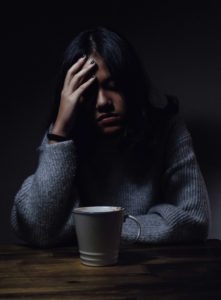Am I depressed? Or am I just having a bad day and feeling sad and blue?
If you’re asking yourself these questions, you’re not alone. Sometimes it’s difficult to know the difference.
If you’re having a hard time dealing with life and are feeling down, your friends and family may be telling you things like, “This too shall pass.” But … will it really?
 Depression is very common these days. Everywhere you turn, you are likely to hear comments like – “I’m depressed” or “this is depressing.” Santa Monica Christian Counseling offers compassionate care and effective therapeutic approaches to help those struggling with depression find the support they need.
Depression is very common these days. Everywhere you turn, you are likely to hear comments like – “I’m depressed” or “this is depressing.” Santa Monica Christian Counseling offers compassionate care and effective therapeutic approaches to help those struggling with depression find the support they need.
Words like “depressed” and “depression” are loosely tossed around in everyday conversations, television shows, movies, novels, comedies and even cartoons.
Your best friend may say she’s depressed because her husband left her, or your favorite sitcom actor may find being out of ice cream is depressing.
Think back to the last time you watched a movie or television show where depression was mentioned. Was it really depression, or was the character just sad? What was the root cause of their feelings? Was their depression based on a situation they were going through or something that was internal?
What is Depression?
The connotations of the word “depression” are vast. Why? Because there are many types of depression and different degrees of depression as well. Depression is different for everyone because everyone is different.
While one may have depression that is caused by a genetic disorder that stems from a biological root, others may have fallen into a depressive state following a situation like losing a loved one or going through a divorce.
Although depression can make you feel sad, feeling sad doesn’t necessarily mean you are suffering from depression. There are certain factors that determine the clinical criteria of true depression.
Depression can present itself in different ways so it can be difficult to distinguish between simply being sad and truly being depressed. To complicate matters even further, there are other physical and mental conditions that can mascarade as depression too.
The word depression is used so often and with so many meanings, it is understandable that many are not aware of what the depression really is and what all it entails. Depression is one of the most prominent mental health conditions in existence.
Symptoms of Depression
Symptoms may include overwhelming sadness, hopelessness and a disinterest in practically everything. While depression can be easily diagnosed in some cases, in other cases, it is not.
 The symptoms and manifestations can differ from person to person making it tricky and confusing to answer the question at hand – “Am I depressed or just feeling sad and blue?”
The symptoms and manifestations can differ from person to person making it tricky and confusing to answer the question at hand – “Am I depressed or just feeling sad and blue?”
According to the National Institute of Mental Health, depression affects about 14.8 million adults in America every year. That amounts to around 6.7% of the population. Depression can rear its ugly head within any racial group. It can affect people of all educational levels and can be found in all socioeconomic sectors. No one is exempt.
Females are more likely than males to suffer from depression. It commonly afflicts the 18-25 age group more heavily and often sets in during the early thirties. Still, young children and elderly adults can have it too.
Depression is cunning. I can vary greatly and has many faces. It can come and go with the seasons, literally.
Because it is such a baffling condition, depression can be difficult to properly diagnose. In order to be certain that what you are experiencing is (or isn’t) depression, it is highly recommended that you consult with your physician.
Your doctor will be able to find out if your condition is being caused by an underlying health issue. If a physical health problem is ruled out, your physician may refer you for further diagnostic testing and treatment.
In order to specifically diagnose and confirm that you have (or don’t have) depression, a full professional assessment is required but you can get an idea of your condition by asking yourself the five questions below.
Five Common Signs of Adult Depression
1. Have you gone through emotional changes?
Emotions and depression go hand-in-hand, unfortunately. What is taking place on the inside of your body often gives way to depressive feelings. You may notice mood swings, irritability, and even anger. It is common to also experience nervousness, restlessness, tension, stress, and anxiety.
It is also common to feel guilt-ridden concerning past events. Even if what happened was not your fault, you may feel as if it was. Hopelessness is another emotion you may be shrouded with. Thoughts of suicide, death and dying may haunt your thoughts. Feeling worthless and out of control are other overwhelming symptoms of depression. You may find yourself crying a lot too.
Some things to ask yourself:
- Do you ever feel your family would be better off if you weren’t around?
- Do you think things are never going to get better?
- Do you feel like it is your fault when things go wrong?
2. Have you lost interest in things that used to make you happy?
When you are depressed, it is common to lose interest in practically everything, even the activities, people and places you used to enjoy. You may find you don’t have the energy to begin a project you were so excited about or don’t have the desire to hang out with your best friend who you always treasured spending time with.
 All the things you always used to look forward to – like the weekend or holidays – hold no allure. Your lack of motivation makes everything a struggle and accomplishing goals may feel impossible. Concentration becomes increasingly difficult.
All the things you always used to look forward to – like the weekend or holidays – hold no allure. Your lack of motivation makes everything a struggle and accomplishing goals may feel impossible. Concentration becomes increasingly difficult.
Social situations may become awkward. You find yourself declining invitations to go places and don’t even care to be around your friends and family. Trips to the market or to run errands are monumental hurdles because you just don’t have it in you.
Doing new things or going new places become very stressful and you certainly don’t want to be around new people. Relationships, even with your spouse or children, fall by the wayside because you lack interest.
Your libido may very well be at an all-time low or non-existent. Feelings of unworthiness may consume you, feeling like you are ruining the life of your significant other. You simply do not have the energy to spare in order to maintain or participate in a relationship.
Some things to ask yourself:
- Are you turning down activities you used to love to do?
- Do you find yourself making excuses in order to avoid people?
- Do the normal things you used to do, like the work you do at your job or simple household chores, seem to be too much to tackle?
3. Changes of a Physical Nature
Depression can bring about a number of physical changes. It can cause stomach problems, issues with digestion, headaches and more. The way your body reacts to the stress associated with depression can stimulate painful actions like jaw clenching, wringing your hands and tensing your muscles.
 Depression can even alter the way you perceive yourself and your health and can change your ability to properly process cognitive-level information which can make it difficult to distinguish between which physical symptoms are real and which are imagined.
Depression can even alter the way you perceive yourself and your health and can change your ability to properly process cognitive-level information which can make it difficult to distinguish between which physical symptoms are real and which are imagined.
Pre-existing health issues and/or conditions involving chronic pain can be the root of depression. Pain on a constant level is indeed depressing. Then again, depression can be the culprit of many illnesses that are commonly associated with it. It can be difficult to know the difference.
It’s common for depressed individuals to feel like they are moving, speaking or thinking slower than they normally do because their cognitive function is slowed. Changes in memory may occur, such as forgetting things more often. Foggy thinking is another symptom often experienced during depression.
Some things to ask yourself:
- Are you getting frequent headaches and body aches?
- Do you feel slower than normal?
- Do you find yourself not wanting to go out because of physical pain?
4. Changes in your Appetite and Weight
Appetites can change according to your state of mind. The way in which an individual’s appetite reacts to stress can vary – some eat more, some tend to eat less and others don’t eat at all. Depression can have the same affect. It can increase or decrease your appetite which will ultimately result in weight changes. If you are depressed, you may find it difficult to maintain a healthy weight.
Some things to ask yourself:
- Have you gone days without eating much or without eating at all?
- Do you find yourself crying and when you stop crying, you feel like eating because it makes you feel better?
- Does your weight fluctuate depending on how you are feeling?
5. Changes in Sleep Patterns
Sleep is a common area that is affected when an individual is suffering from depression. You may find that you are struggling to stay awake and that all you want to do is sleep. It can seem like sleeping is the only way you can deal with the way you feel. Having little or no energy and feeling constantly drowsy are signs of depression which can lead to excessive sleeping.
Or, you may find it very difficult to sleep. Your mind may be consumed with anxiety, making it difficult to fall asleep and when you do, causing your sleep to be restless and intermittent. You may wake up wondering if you really slept at all.
Too much or too little sleep gives way to a destructive cycle. It can cause you to be tired all day due to the lack of proper sleep. Adequate sleep is necessary for the body to heal and fight off sickness and diseases so changes in sleep patterns can open the door to even more problems.
Some things to ask yourself:
- Do you find yourself sleeping for 10 or more hours a night but you’re still sleepy when you awake?
- Do you stay awake all night long or wake up at random hours of the night, unable to go back to sleep?
- Is falling asleep next to impossible sometimes?
If You are Suffering from Depression, Christian Counseling Can Help
In asking yourself the questions above, you may have reason to believe that you are depressed. Depression is more common than you may think. The rates of diagnosed depression soar higher every year although many who suffer from depression are never actually diagnosed. Those who are diagnosed don’t always end up seeking treatment.
It is important to know that you don’t have to keep feeling the way you do. There is help available for you. If you have one, two or even all of the above symptoms, you may have depression. It’s imperative that you seek out treatment so the underlying root can be discovered because there are a number of possible issues that may be causing or triggering your condition.
The professional, skilled counselors at Santa Monica Christian Counseling frequently work with clients who are battling with depression. Reach out and call us today so we can set up a meeting with you and help you get back on track to the life you once enjoyed.
“Depressed,” Courtesy of Anh Nnguyen, Unsplash.com, CC0 License; “Downcast,” courtesy of whoismargot, pixabay.com, CC0 License; “Alone,” courtesy of RenaudPhoto, flickr.com, CreativeCommons License; “May Rain,” courtesy of Sam Burriss, unsplash.com, Public Domain License


